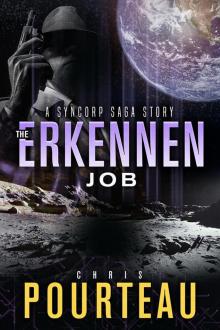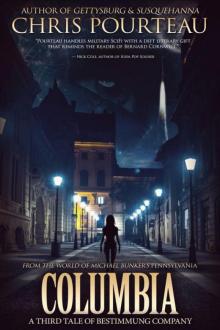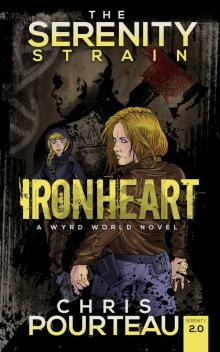- Home
- Chris Pourteau
Ironheart (The Serenity Strain Book 2) Page 2
Ironheart (The Serenity Strain Book 2) Read online
Page 2
Lauryn kept herself in profile, presenting a skinnier target. Edging closer to the jagged glass of the laundromat’s doorway, she stretched her neck to see.
“Anything?”
Stavros’s voice made her jump. Lauryn closed her eyes and cursed him. Were her finger on the trigger, she knew, they’d be down one bullet and the whole town would know exactly where they were. She twisted her head sharply toward the scientist to warn him again to keep his mouth shut.
Then she saw his eyes go wide as he stared beyond her into the street. A chill wiggled up her spine. At that moment she heard someone’s feet slap by outside, running fast, a blur racing across her peripheral vision.
Lauryn dropped to one knee and once again swept her pistol at the door.
Only leaves stirring.
“Someone just ran by,” Stavros said in a stage whisper.
Lauryn ignored him. The time for caution was past. She stood and moved quickly, placing her back against the front wall. Pistol extended, she looked up the street where the footpads had come from.
Fog.
That damned yellow-orange fog from earlier in the day. The misty cloud that seemed to move on its own, that had vomited Marsten and the others forth to attack them. Snapshots bloomed in her mind: the charge up the stairs, the battle on the roof. The—
Lauryn shook her head to clear it. Orange spots dotted her vision, then faded. Was it that fog or the dusky heat of sunset playing hell with her imagination?
Then she saw them. Two people barely clothed in rags, hunch-running along the street toward the washateria. First one, then a second. They appeared gaunt, emaciated, like they hadn’t eaten in weeks. Their ratty clothing flapped behind them in strips.
Lauryn pushed her back hard into the wall.
The ghosts in rags slap-slapped the pavement with their bare feet, rheumy yellow eyes staring fixedly ahead at some unknown destination. They were so intent on getting where they were going, they didn’t so much as glance at the washateria.
“Well, what is it?”
Goddamn Stavros.
Lauryn held her position but quietly brought her gun, straight-armed, around to aim it in the scientist’s direction. She kept her eyes on the street but heard the man’s teeth click behind her when he shut his mouth.
The too-skinny humans ran by, following the same path as the first. That made three. Or was it four?
Keeping her pistol trained on Stavros, Lauryn flipped across to the other side of the entrance, hugging the wall, her eyes tracking the ragged strangers as they shuffled down the street.
Her training kicked in, and she made mental notes of what she was seeing. Their clothes, worse than rags, barely covered them at all. One man ran, heedless of his exposed genitals dangling on the run. Reedy bones looked ready to slice open his thin hips from the inside. The second of the pair was a woman, her slack breasts flat and empty against her chest, running straight through the broken glass littering the sidewalk in front of the washateria without a care or cry of pain, as if immune to it.
She waited three more moments, counting one-Mississippi style, and watched them run on mechanically down the street. When all she could hear was the slap … tap … tick of hanging banners and debris again, Lauryn lowered the gun pointing at Stavros.
His eyes were hard as she made her way back to their metal fortress. “You could’ve shot me, you know,” he said.
Lauryn pointed the pistol at the ceiling, showing him her index finger, extended along the barrel. “Trigger discipline. Not that I wasn’t tempted, motormouth. You should talk with your inside voice from now on.”
Stavros opened his mouth to respond, then realized what she’d said.
“We need to move,” Lauryn said. “This place isn’t safe anymore.”
“What? Move where? Who were those people? And it’s almost nighttime. I thought this place was—”
“It’s off the beaten path, yes,” she answered, gathering their few supplies into her backpack.
Jasper raised his head again to watch, then satisfied that the danger was past, reclined again on the cold cement floor.
“But it’s not secure, not by a long shot,” she continued. “You just saw why. If those people come back, or others … well, all they have to do is walk through that open door. We need to find a better place to hole up. And we’re low on ammo—something else we need to take care of.”
The look on Stavros’s face said he understood.
“What were those things?” he asked. “They looked anemic. Downright anorexic.”
Kneeling beside Megan, Lauryn was about to shake her daughter awake but paused. “What do you mean what were they? Other people. Humans, right? What else could they be?” Her voice sounded incredulous and unsure at the same time.
Stavros stared at her for a moment and Lauryn stared right back. “Yeah, what else?” he finally said. “Look, wait. Before you wake your daughter up. I don’t want to disagree with you … and I damned sure don’t want that gun pointed at me again … but it’s getting dark and they didn’t see us.”
“The next ones might just wander—”
“I know that,” he said, cutting her off. Lauryn glared at him. “I know that,” repeated Stavros, softer this time. “But in here, at least, we have shelter for the night and can see them coming. Out there…” He let her imagination do his explaining for him.
Lauryn looked at her daughter, still sleeping despite everything. Even more soundly than before, Lauryn noticed. Of course she was. Megan possessed her father’s capacity for blissful repose, whatever the circumstances. But at least, now, she seemed genuinely restful. Lauryn debated for a moment longer, then bowed to the scientist’s logic.
“Okay, then. No lights. No talking. And you practice trigger discipline when it’s your turn on watch. Never touch that trigger till you’re ready to shoot, understand? Else, you waste a bullet and alert the neighborhood.”
Stavros nodded.
“First light, we move to a different place. Higher up, and further away from downtown.”
He nodded again. “So …” His tone was hesitant, like he wasn’t sure how to ask an obvious question. “What do you think they were? Really?”
Lauryn regarded him for a moment, her own hesitation hanging between them. Then something flicked past in her eyes, an I-don’t-know-you-that-well look.
“I’ll take first watch,” she said.
* * *
Marsten jerked his head away, casting another hateful look at Maggie.
“I know it hurts,” she said. “I know it hurts, baby.”
As she started to dab his face again with the rag, the Maestro snagged her wrist. “Don’t call me that. I’m not your baby. I’m not your beau. I’m not your promised-to-be. And be careful with that crap.”
Maggie tried to pull her hand from his grip but soon gave up. Marsten stared sidelong at her from beneath the stretched skin surrounding his left eye, then released her arm. There was a palm-like, starry pattern along the left side of his face, swollen and blistered. It looked as if the Molotov that crazy bastard threw had reached out and anointed Marsten with fire. But then the crazy bastard got his, didn’t he? Marsten had told them the story. How the man charged him, crazy, taking them both off the roof. How Marsten had been lucky when the nutter splattered and bounced beneath him, saving him, like a meat cushion on the pavement.
“Not lucky,” Id said when he’d told the story. “Destined.”
Maggie wrinkled her upper lip as she applied the ointment, more carefully this time, to Marsten’s burns. Everything that bitch says sounds like it’s meant to be written down in some holy book, she thought. Then, thinking it, remembered the melodic quality of the goddess’ words, alluring in their inflection. Maggie hated herself for wanting to hear her speak again.
Someone was approaching.
“What is it?” asked Marsten, irritated. Speaking stretched the skin where Maggie was applying the salve, and he hissed.
“The Lady wishes
to see you,” said Simpson. “It’s almost dark.”
Immediately, the Maestro pushed Maggie’s hand away, preparing to rise.
“Just a little more, baby,” she said. “Another minute or—”
Marsten’s hard, straight palm sprang up faster than Maggie could blink. The sound of flesh surrendering to bone whip-cracked around the marbled courthouse. Dozens of the Weisshemden rubbernecked, relieved for a moment of their boredom. Most were men. Many smiled.
“I told you no more of that baby crap,” Marsten said, staring down at her.
Maggie had fallen hard. First there was the electric pain where her tailbone hit the floor, then the blossoming burn in her right cheek. Instinctively, she raised the rag of ointment to dab at the red fire that was the right side of her face. She watched, shocked and speechless, as Marsten turned his back on her.
“She wants action,” Simpson was saying as they walked away. “She wants us moving, and soon.”
Marsten grunted as he approached the Lady’s throne, a judge’s bench sculptured in black marble, seated in the center of the rotunda. A monument to the impartial rendering of justice. Even-handed, as he’d been with Maggie, he mused to himself.
She sat provocatively on the edge of the bench, her legs dangling loosely over the cold stone, a naked schoolteacher overlooking her pubescent students. Her long, red tendrils of hair moved with a life of their own, a shroud of snakes protecting their mistress.
Sometimes they covered up the fun bits, Marsten noticed.
Sometimes they didn’t.
“I want us moving into the city,” she said simply, with no foreplay. “He Who Is To Come has touched the world. Already, other worlds are crossing over into ours. And we are not yet prepared.”
Marsten stood still and staring, as always enthralled by her beauty. Listening to her was almost as provocative as watching her hair caress her body. Her voice dripped honey in his ear.
No, he thought, not honey. The nectar of the gods.
“Maestro.”
Although sometimes her tone smelled less of nectar and more of brimstone.
“Apologies, Lady,” he said, bowing. “Your beauty, as always—”
“Perhaps I’ll strike you as you did your general,” Id said. “Will that focus your attention to our common purpose?” A ball of her red hair unrolled through the air between them, jerked away from Marsten like a whip, then slowly, sensuously, reached out to touch his scarred face.
Marsten blinked. But he hadn’t flinched.
“As you wish,” he breathed. “I am the instrument of your pleasure.”
Id’s hair traced the lines of his burns for a moment, stroking them like breath. “We are not prepared, Maestro. Others of my kin are advancing while we sit.”
“Others?” He shuddered at the lightning arcing across his skin where she traced his wound. Beautiful pinpricks of pain. Realizing his eyes had closed of their own accord, Marsten opened them. His left lid opened a little.
“There are worlds converging.” At Marsten’s look of incomprehension, Id waved her hand. “It is not something you need yet understand. All you need to do is…” Again her hair whipped back, a cobra preparing to strike. Again the red whip relaxed and returned to stroking his face. “Focus.”
With great effort, Marsten held her eyes, forcing the wheels in his head to turn despite the sculpted, naked perfection she presented. His brain worked like some great, lumbering draft animal attempting to pull water from the dust-dry ground below. “We need to get to Houston,” he said. “Set up there and recruit more of our Army of the Black Hand. Prepare ourselves for when the worlds truly converge.”
“Yes,” she answered, the sound of her voice once again a blessing upon him.
“The roads are jammed. We have thousands of soldiers to move. It will take some time.”
Her gaze penetrated him. Those green eyes, burning liquid fire in his veins. But not burning his skin, not like on the roof. Burning his soul.
“Time is short, Maestro,” the Lady said. “I have allowed you time to lick your wounds today. Now, we must move forward.”
Her tone thrummed with the power of a demonic choir. Part of Marsten began to panic, a feeling he was unaccustomed to. It reminded him of his dreams in prison. Of the little girl who took his axe and chopped him into pieces. Before he’d thrown off Professor Herr Stavros’s voodoo and come back to himself. Before he’d become the Maestro.
The panic of paralysis—that’s what her emerald eyes evoked in him.
Three days to move an army of thousands forty miles along jam-packed roads? He supposed if they started walking now…
Through his slagged left eye, Marsten saw a blurry hand rise into the air. The absurdity of it made him want to laugh out loud. It almost broke his inability to speak under the Lady’s acid stare.
“I have an idea,” said Simpson.
Chapter 2: Monday, evening.
“Speak,” said the Lady.
Simpson lowered his hand.
“When I lived in California, I worked for the transportation department. We used to prepare for these kinds of situations all the time. I mean, come on—earthquakes, right? Mudslides? Wild fires? The department trained all the time with local agencies. The National Guard. I mean, all states do it, but California, you know, they use emergency response more than most.”
Marsten was staring at him. Maggie walked up to stand on the Maestro’s right. She reached forward and slid her palm around his massive forearm. Marsten allowed it, Simpson noticed. She held the cloth against her red cheek with the other hand.
Simpson turned to Id, who merely looked bored. He decided he should take for granted they knew how natural disaster-prone California was and cut to the chase.
“One of the main things we trained for was moving large numbers of people from disaster areas. Quickly and efficiently. We kept protocols with the metropolitan planning agencies to commandeer commuter trains, buses, whatever it—”
The Maestro turned to face him directly, slipping Maggie’s hand off his arm in the process. The Lady sat forward on her throne of black marble.
Cut to the chase, idiot, Simpson thought. “Mass transit,” he said, assuming that made everything clear. Honestly, he was just happy to stop speaking. With the glare of a goddess and his Maestro’s hard stare resting on him, he wished now he’d resisted the impulse to raise his hand in the first place.
Marsten took a step forward and placed a massive hand on Simpson’s shoulder. Looking up into the Maestro’s eyes—especially that scorched orb—made the quiet man want to run in the other direction. Like he’d run from California to Texas, before the hammer fell. He remembered Franklin and the horror show of his failure with the Maestro less than a day ago.
Jesus, can that be true? Only that long?
“Simpson, you’re one of the few of us left,” said Marsten. “And so, I just want to tell you, I appreciate that you’re even here. I mean, you’ve shown me just how smart being the quiet one can be, y’know?” The Maestro clapped Simpson on the shoulder with his free hand, then held him firm. “Right up until now.”
The Weisshemden, the ghosts in white jumpsuits with blackened forearms and lined with burnt red veins, began to stir around them. He felt his belly begin to sink.
“Let him speak,” said the Lady. “Let him prove himself more than a quiet survivor.”
Simpson saw the Maestro’s expression register the order, but there was something else in them. He couldn’t refuse Id’s command, that was true. But Marsten seemed disappointed he’d lost the opportunity to discipline Simpson, to make him understand just where his head rested in the stack on the totem pole.
“You heard the Mistress,” said Marsten. Simpson felt the brotherly squeeze of the big man’s hands on his shoulders, the grip lingering a moment longer than necessary. “Do continue.”
The words sprinted out of Simpson’s mouth. “We can move them, the army I mean, with the buses.”
The Maestro tilted his
head, and Simpson read in his scarred face a confirmation of failed expectations. A father’s definitive disappointment in his imbecile son.
“Conroe is not California. It’s not even Houston. It’s a little shit town. It doesn’t have a mass transit system.”
The whiteshirts began to murmur around them.
The Maestro’s fingers squeezed Simpson’s shoulders again, and the urge to run consumed him. He was determined not to go like Franklin, not willingly. The queasy taffy in his stomach began to harden into a stony resolve to fight for his life.
The whispering of the ghosts around them grew louder. Sliding syllables that sounded like yes-yes-yes slithering along the rotunda’s walls.
Marsten looked to Id. “I apologize for—”
“School buses!”
The slithering ceased. Its echo died around them.
The Maestro slowly returned his ruined gaze to Simpson, who tried hard not to stare at the weeping skin of Marsten’s scarred left eye.
“School buses?”
“This is a big enough town, big enough for a decent-sized school district anyway,” Simpson explained, offering words as wards against Franklin’s fate. “It’s got to have buses. Lots of ’em, right? I mean—”
“Stop speaking now,” breathed Marsten. He was connecting the dots for himself.
“He’s right! I know this area. This school district is huge!”
The Maestro looked past the milling crowd of whiteshirts to find the gangly man pushing his way through.
“There’s bound to be dozens of buses at the CISD main bus barn,” enthused Cackler as he approached.
Simpson felt Marsten’s grip relax the slightest bit.
“You know where the place is?” asked the Maestro.
“Sure! Not far from here, maybe a coupla miles. I know this area!”
“You said that.” Though Marsten’s stare lingered on Simpson a moment longer, he released his shoulders and turned to Maggie. “How many are we now?”

 Masada's Gate
Masada's Gate Valhalla Station
Valhalla Station The Erkennen Job
The Erkennen Job Susquehanna
Susquehanna Columbia
Columbia Gettysburg: A Tale of the Second War for Pennsylvanian Independence
Gettysburg: A Tale of the Second War for Pennsylvanian Independence Tales of B-Company: The Complete Collection
Tales of B-Company: The Complete Collection Ironheart (The Serenity Strain Book 2)
Ironheart (The Serenity Strain Book 2) Stormbreak (The Serenity Strain Book 1)
Stormbreak (The Serenity Strain Book 1) Legacy Fleet: Avenger (Kindle Worlds) (The First Swarm War Book 2)
Legacy Fleet: Avenger (Kindle Worlds) (The First Swarm War Book 2) Shadows Burned In
Shadows Burned In